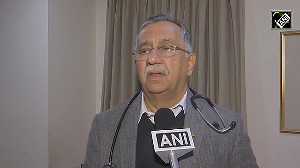 Tata Housing sells an apartment every two days through the online medium and expects at least 30 per cent of its sales to come from this platform in three to five years.
Tata Housing sells an apartment every two days through the online medium and expects at least 30 per cent of its sales to come from this platform in three to five years.
Brotin Banerjee, managing director and chief executive officer, talks to Business Standard on how the e-commerce space has broken down the barriers between a buyer and a seller.
Edited excerpts:
After the Google online festival, you tied up with Snapdeal for selling/booking apartments of Tata Value Homes (a subsidiary of Tata Housing, into affordable projects) online. What is the strategy, when you can sell on your site as well?
E-commerce is no longer limited to apparel, gadgets and white goods. Consumers are even buying houses over the internet.
We are in the process of changing the way real estate has been sold.
We expect online to emerge as one of the fastest growing channels for real estate sales. Besides, we are aiming to create new and innovative ways to reach the target audience.
How many apartments have you been able to sell online till now? What is the target for the next two years?
We started selling homes through our own website in December last year and piloted the online platform through our partnership with Google during the Google Online Sales Festival around the same time.
Since then, we have had an overwhelming response from across the globe.
We have been selling one house every two days through this medium.
We have sold over 700 units, with a value of at least Rs 400 crore (Rs 4 billion).
Looking at the growth in e-commerce and increasing penetration of the internet, we expect at least 30 per cent of our sales coming through the online platform in three to five years.
Do you see yourself featuring in all e-commerce portals in the near future or is it an exclusive arrangement with Snapdeal? Also, do you think the online medium would grow faster? How big is the online market for real estate and how much growth are you expecting in this medium?
We’re witnessing a surge in Indian consumers buying online.
The partnership with Snapdeal has been successful.
While we have a long-term association with them, we would continue to look at other innovative options to reach prospective consumers. Online is still emerging as a route for selling.
The percentage growth would definitely be higher as compared to offline sales, as the base is negligible.
According to a Google study, over the past four years in India, real estate transactions of $43 billion have been influenced by research done on the internet.
The India consumer is opening up to buying products that were not traditionally sold online, such as real estate and cars.
We strongly believe online would emerge in the near future as a preferred route for buying real estate.
How much sales do you expect in the coming festival season and how much better would it be compared to the past two years? And, how much growth in revenue are you expecting?
Enquiries have definitely gone up as compared to the same quarter last year.
Over the past half-decade, we have grown at a compounded annual rate of around 80 per cent.
Simply put, the business has almost doubled every year and the company is currently constructing 70 million square foot of saleable properties across the country.
Though it will be difficult for us to retain the same level of growth, we would continue to grow at a CAGR of 30-40 per cent over the next three to five years. We are targeting annual revenue of Rs 5,000 crore (Rs 50 billion) in the same period, from the Rs 1,000 crore for (the year ended) March 2014.
Are you seeing revival signs in the market, after the new government?
The industry is witnessing improvement due to the recovering economy, resulting in increase in enquiries.
There is also stability in real estate prices over the past few quarters.
Also, the market is witnessing the positive sentiment of a stable government at the Centre.
The stability in the market has resulted in buyers coming forward this festive season.
In addition, the demand for affordable housing has picked up. We believe the economy should completely recover by the first quarter of next year.
Image: Brotin Banerjee; Photograph: Kind courtesy, Business Standard







 © 2025 Rediff.com -
© 2025 Rediff.com -